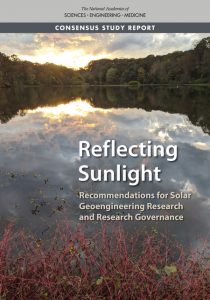Originally published at Legal Planet as “Four Emmett Institute scholars react to an important new report“
The US National Academies of Science, Engineering, and Medicine recently issued an important report Reflecting Sunlight: Recommendations for Solar Geoengineering Research and Research Governance.

The National Academies’ report strikes the right tone, particularly considering the committee’s difficult, if not controversial, mandate. It foregrounds solar geoengineering’s apparent ability to reduce climate change while noting that solar geoengineering could also introduce its own risks, governance challenges, and ethical objections. The suggested research program is (and should be) quite small relative to efforts toward other climate responses, would include and integrate diverse disciplines, and should aim to generate policy-relevant knowledge—not a path toward implementation.
A couple of the specific recommendations resonated with me. First, the report recognizes that, in the absence of state action, diverse nonstate actors—scientists, their research institutions, funders, publishers, and professional societies—can and should play important governing roles in the meantime:
Recommendation 5.1b Funders of SG [solar geoengineering] research—including government agencies, universities, and philanthropic organizations—should mandate as a condition of funding that SG research adhere to an accepted code of conduct or, if no code has yet been accepted.
This echoes what my Emmett colleague Ted Parson and I wrote last year: that these actors have the capacity, knowledge, and interests, for example, to help enable high-quality research as well as to control potential harms and risks via the development, monitoring, and enforcement of norms, guidelines, and standards. Second, the report says that “SG researchers should pledge not to assert patents relating to SG against other researchers who are conducting related research.” This is based on a pair of papers by Jorge Contreras (University of Utah), Joshua Sarnoff (DePaul University), and me. There, we describe how a bottom-up “research commons” centered on “patent pledges” could manage several issues in this space while maintaining scientists’ and inventors’ incentives to innovate.
Finally, the recommendations’ are remarkably international. Granted, that scale was part of the committee’s task. Nevertheless, international aspects—variously cooperating, coordinating, consulting, and co-developing—are prominent even in the report’s highest level statements. For example:
Recommendation 4.1…The [research] program should, from the outset, prioritize development of international coordination and co-development of research with other countries.
Recommendation 5.1 A U.S. national solar geoengineering research program should operate under robust research governance and support the development or designation of an international governance mechanism.
This is notable because the US has been accused—sometimes fairly, sometimes not—of dodging if not undermining international cooperation and governance—including in matters of the environment, climate change, and geoengineering. Some critics purport that solar geoengineering is prone to unilateral action, especially by superpowers, and that the National Academies’ report is an indication that the US intends to push and control this issue. In contrast, the report’s recommended early international cooperation would foster trust and help prevent conflict. Hopefully this outlook remains as Congress, agencies, and nonstate actors consider and take up the committee’s recommendations.
